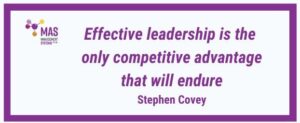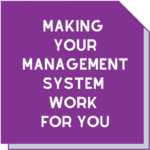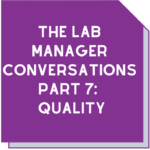The Lab Manager Conversations part two – Leadership
We’ve been speaking to lab managers and leaders about their roles and challenges. These conversations have been collated into a series of articles that will probably resonate not only with lab leaders, but those across other businesses as well.
While their pathways may have been somewhat different, all our respondents have clocked up well over 10 years of experience prior to their current roles They also cover the spectrum of calibration, chemical, microbiology, electrical, inspection and environmental laboratories.
And although they were pleased to talk through their issues, by request we’ve changed their names to maintain confidentiality.
Last week we looked at hiring new people. This week we investigate how to lead them.
Leadership and managing people
 From onboarding new staff to encouraging existing ones, there’s always something to learn about being a leader and people manager.
From onboarding new staff to encouraging existing ones, there’s always something to learn about being a leader and people manager.
Of course, the style of management and interaction with staff varied, depending on the personality of the respondent. But there were some consistencies – expectations and trust.
Daniel: “Creating trust is critical for a good leader. People need to be able to come to me with their issues. I have a consistent, measured approach when it comes to managing my people. I keep the rules very simple because in a sometimes-chaotic environment, this creates order”.
Lauren: “I need to be able to trust my staff which means teaching them well. I let them make mistakes because I’m there to oversee, not micromanage. In my lab if you do your job and be an adult, you’ll be fine. And that approach leads them to trust me too”.
Sarah: “I empower my staff to find solutions themselves. My door is always open but want them to come to me with ‘this is what I’ve tried and that didn’t work, what else can I do’ rather than shrugging over a problem. As a leader, I want them to have confidence to do it themselves and trust that I’m there as a back-up. And of course, I expect them to learn from their mistakes.”
Learning from experience

When setting up his own business Neil came from a different place – “I’ve had some bad managers in the past, so I used them as an example of how not to manage! I’m really mindful of treating people well”. To him this means being direct, up front and setting clear expectations.
When you think about it, the ‘expectations’ part of leadership is something that is covered in ISO standards. All of them feature requirements to define things like roles, authorities, and responsibilities. That ‘definition’ includes not only the ‘tasks’ people are asked to perform but other elements of activity and therefore competence that might be explicitly written down.
Why not personalise your lab’s systems to encompass some of these things? Don’t assume you’re writing something to simply meet an auditor’s preconceived ideas of the requirements. And from that, relationships of trust will follow.
Promoted to the role
Sometimes lab managers can be brought in from outside but often this is an internal process. This means that you’ll now be managing people you were recently joking with in the tearoom.
We know that work friends are important but once you become a manager, these relationships must change. You’re now privy to information that they’re not, so you can’t be as open as you were when you worked side by side. Plus, you’ll be making decisions that will affect their jobs and their careers.
So that means making a conscious effort to decide how to handle those relationships because there must be a professional distance.
Lisa was fortunate. Her business has an excellent support structure in place which made the move seamless: “I was mentored through the process and given the opportunity to develop leadership skills. With the support of the company, I did a Diploma of Management which taught me things like having STAR (Situation, Task, Action, Result) conversations and setting SMART goals”.
Managing your changes
 You’ll also need to manage your own expectations and accept that relationships will change. That doesn’t mean you can’t still have conversations about common interests – you haven’t suddenly become a different person! But sitting down with your team members and discussing what your being a manager will look like should help everyone feel more comfortable about the changed circumstances.
You’ll also need to manage your own expectations and accept that relationships will change. That doesn’t mean you can’t still have conversations about common interests – you haven’t suddenly become a different person! But sitting down with your team members and discussing what your being a manager will look like should help everyone feel more comfortable about the changed circumstances.
This will also give you the opportunity to gauge how individual team members are feeling about your promotion.
Whether you’ve been promoted internally or been brought in from the outside, be prepared for possible issues.
Lisa: “Some people may be upset that they missed out on the role. Others could become more stand offish or perhaps even ignore your authority. Having clarity right from the start should head problems off before they begin”.
Daniel has a slightly different approach: “If you’re going from peer to supervisor, try putting yourself in their place. Keep the relationship as similar as possible and move the boundaries gently. You don’t want people to leave if they see your promotion as an issue. And this is particularly true if you’re suddenly supervising people you used to report to”.
Giving up the familiar
While being promoted to the lab manager role is an exciting step it can also be a scary one.
Victor: “When I got the job, I was so pleased! But then I was terrified! Because suddenly I had so much more responsibility. I didn’t want to let management or my team down, so I was working so hard, 11-hour days, just to be sure I was across everything. I wanted to prove that I could do the job. Obviously, things settled down but for those first few months it felt like the world was on my shoulders!”
While it’s easy to hold onto those familiar lab activities you’re most comfortable with, there will be things that only you as a manager can do. And getting clarity about your role as a manager is the first step.
Lisa got a very clear understanding of what the job entails: “Don’t make assumptions! I sat down with my boss with the job description and got really transparent statements about what I’m responsible for. And knowing that I’d be involved in more strategic activities gave me the push to train my staff to do the tasks I’d been doing because I knew I just wouldn’t have time to do it all”.
That meeting is also a good time to identify any knowledge or skill gaps you need to fill to execute the job effectively.
Don’t be the exemplar of the Peter Principle that people in a hierarchy tend to rise to “a level of respective incompetence”: At every stage of your career journey, be brave enough to recognise that skills that were successful in previous jobs are not necessarily the only things you need to have for success in another role.
Managing takes time
 Despite enjoying her role, the amount of time managing her team takes was surprising to Lauren. “I knew there would be a focus on my team, but it took a while to get into a routine and a rhythm. Developing training plans, leave arrangements, team meetings, individual catch ups – it takes a chunk out of your day! Staff management probably accounts for about 30 percent of my work time”, she said.
Despite enjoying her role, the amount of time managing her team takes was surprising to Lauren. “I knew there would be a focus on my team, but it took a while to get into a routine and a rhythm. Developing training plans, leave arrangements, team meetings, individual catch ups – it takes a chunk out of your day! Staff management probably accounts for about 30 percent of my work time”, she said.
However, she believes those individual catch ups are extremely important. “It helps to build a different level of trust,” she explains. “People can find it difficult to express what their issues are, not just at work but personally. But if they know they have a regular one-on-one with you, they become more comfortable about opening up. It’s time well spent”.
Taking a step back on where we might get some clues to do this, we could look to the fundamental principles of Quality and the need for an organisation to engage people. Whilst ISO 17025 and ISO 15189 might not be so explicit on this topic, ISO 9001 gives us some better clues to understanding this investment.
It asks an organisation to understand the needs and expectations of interested parties that are relevant to the quality system. Staff are an important interested party which is overlooked.
How should we engage with that interested party? Just like we might do with customers and suppliers we could do surveys. We could do an annual performance review. And we could take time out to develop a relationship built on trust by talking with, not to, our staff.
Each activity takes time and energy to bring about and as Lauren has experienced, there is value in the individual catch-up. This can be easy to say and difficult to do in a busy work schedule. But perhaps it comes back to our personal and organisational goals. We need to define what is and what isn’t important in life as a Lab Manager.
Next week we’ll discuss staff development, training and keeping people motivated.
Download the article The Lab Manager Conversations series – part two





